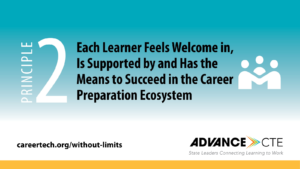Advance CTE continues to host sessions for a five-part summer lunch and learn series delving into each of the five principles of Without Limits: A Shared Vision for the Future of Career Technical Education (CTE Without Limits). Each session features a panel of leading voices from organizations across learning and work followed by interactive group discussions on the information shared and next steps. Last month, the session delved into the second and third principles of the vision.
 The second principle of CTE Without Limits aims to support Career Technical Education (CTE) leaders as they to identify and dismantle systems that perpetuate systemic barriers and discrimination that limit access, opportunity and outcomes for learners across every aspect of CTE design, delivery and evaluation. This panel featured Amanda Bergson-Shilcock, Senior Fellow for National Skills Coalition; Mimi Lufkin, CEO Emerita of National Alliance for Partnerships in Equity (NAPE); and Dr. Stephanie McGencey, Executive Director of American Youth Policy Forum (AYPF).
The second principle of CTE Without Limits aims to support Career Technical Education (CTE) leaders as they to identify and dismantle systems that perpetuate systemic barriers and discrimination that limit access, opportunity and outcomes for learners across every aspect of CTE design, delivery and evaluation. This panel featured Amanda Bergson-Shilcock, Senior Fellow for National Skills Coalition; Mimi Lufkin, CEO Emerita of National Alliance for Partnerships in Equity (NAPE); and Dr. Stephanie McGencey, Executive Director of American Youth Policy Forum (AYPF).
Key Themes
- Equity Investments in Self and System: The moderator and panelists each acknowledged throughout the session that success in this principle requires an individual learning journey on equity and realizing what lenses are missing from your and the collective table before examining and collaborating on systems change.
- Elevating Learner Voice and Diversity is a Win-Win: Dr. McGencey emphasized that learners can teach us what they are living, gaps in CTE experiences, and what they need from systems if they are given the spaces to do so. Bergson-Shilcock offered the example of an airport faucet sensor that did not recognize high-melanin skin tones as a simple but powerful analogy of the lifelong impacts systems have on learners when diverse voices are not at the table.
Recommendations for Implementation
- Expanding DEI in CTE: Each panelist offered tangible steps for state CTE leaders to build diverse and culturally competent CTE workforce and experiences, including intentional outreach to leaders of color such as employers and Greek life organizations to build connections and gain valuable perspectives; increased flexibility in on-ramps and licensure for teaching professions; and prioritizing cultural competence in professional development.
- Utilizing Equity Impact Phases: Lufkin offered a modified change management model, UA2 used by NAPE on their continual journey of equity education: Unaware -> Aware -> Understand -> Action.
- Getting Started Matters: “neutrality is the side of the status quo” and “it’s not about winning, but about moving forward” are two powerful statements that emerged from multiple comments about the importance of just getting started on advancing equity while also building consistent checkpoints to revisit and re-center learner voice, marginalized learners and ‘known unknowns’ of equity perspectives.
Visit the CTE Without Limits web page to read the full vision and access resources to communicate the vision to stakeholders, including full recordings of each session and a new vision partner initiative repository documenting national initiatives across the five principles.
Register for Advance CTE’s fourth lunch and learn scheduled for August 17 at 3:00PM ET featuring Jonathan Alfuth, State Policy Director for KnowledgeWorks; Molly Bashay, Senior Policy Analyst – Education, Labor & Worker Justice for The Center for Law and Social Policy (CLASP); and Niki DaSilva, Manager for Programs and Policy a the U.S. Chamber of Commerce Foundation Center for Education and Workforce. A recap of the first session of the series can be found here.

